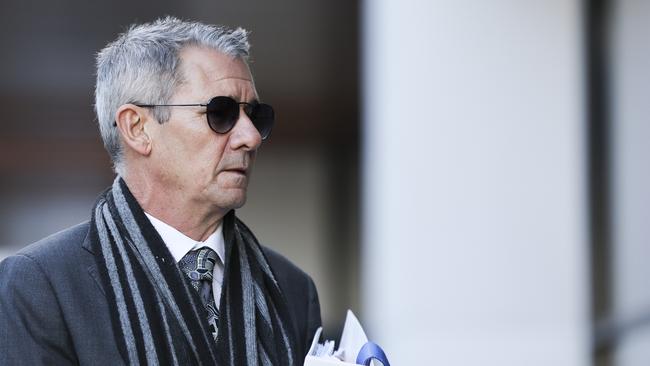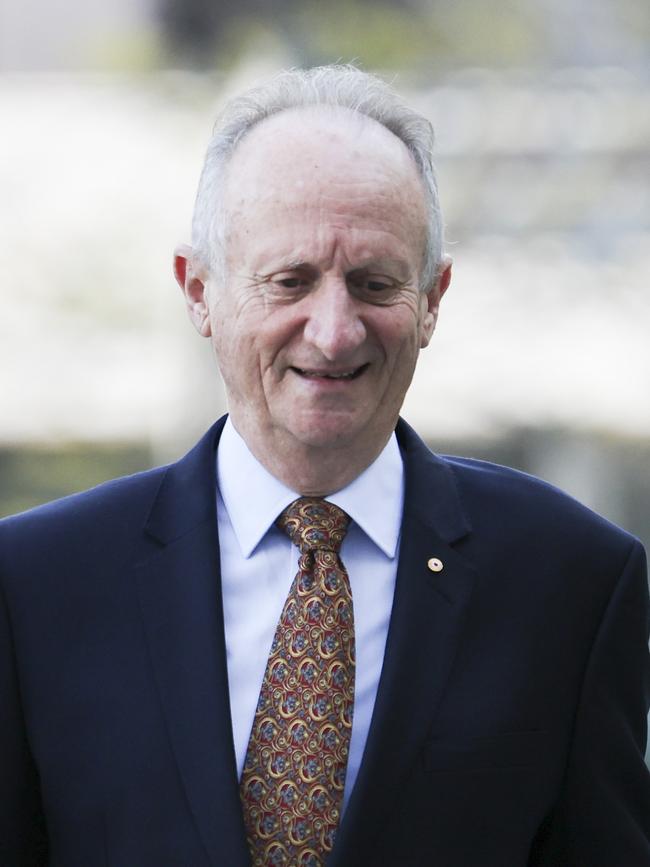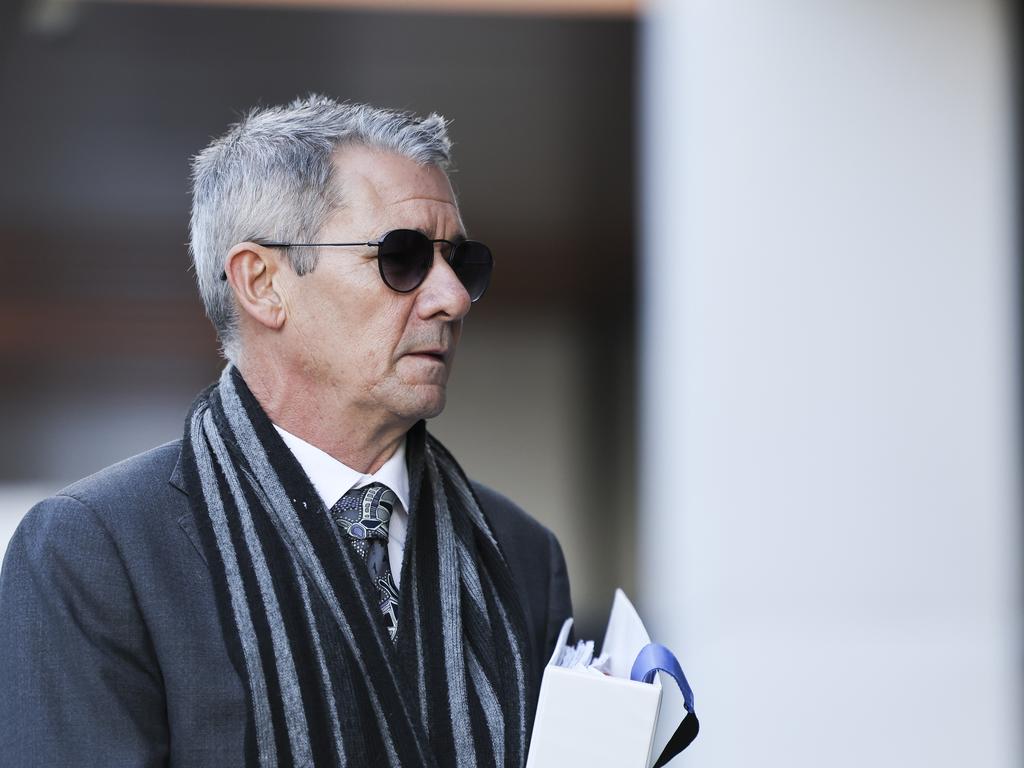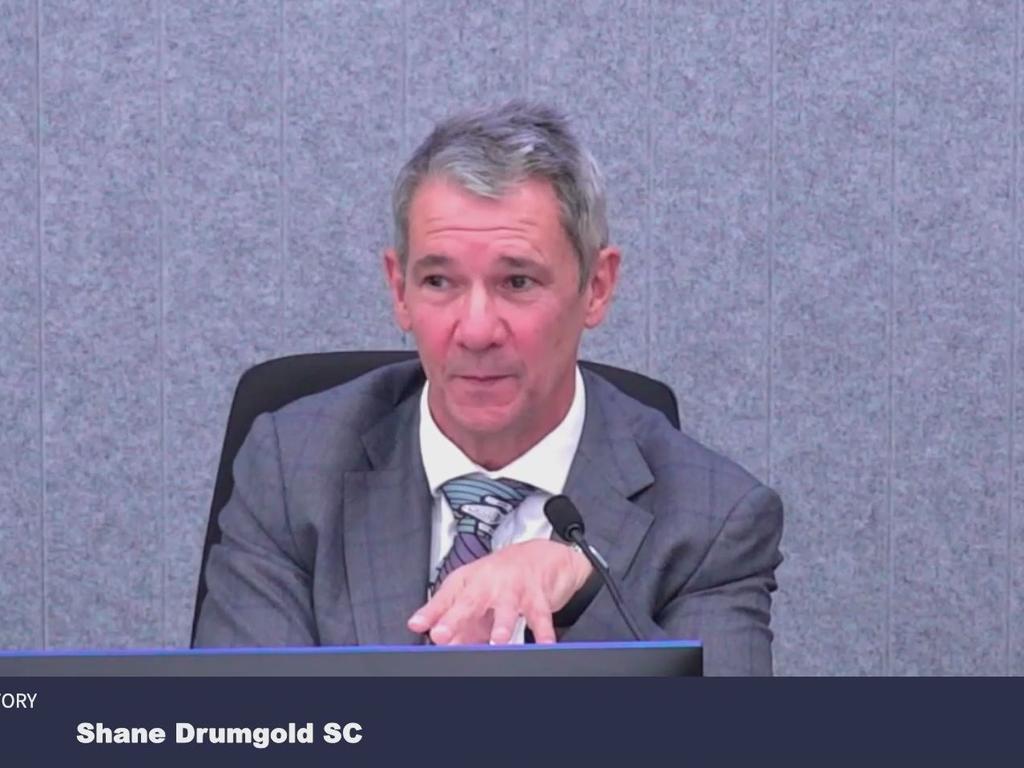Sofronoff inquiry: I was wrong on political meddling, says ACT DPP Shane Drumgold
Shane Drumgold has admitted he was mistaken in suspecting political interference by Linda Reynolds and Michaelia Cash in the police investigation of Brittany Higgins’s rape claims.

In a stunning about-face, ACT chief prosecutor Shane Drumgold has admitted he was mistaken in suspecting political interference by former Liberal ministers Linda Reynolds and Michaelia Cash in the police investigation of Brittany Higgins’s rape claims.
Withdrawing his suggestion that it was “possible if not probable” that there was a political conspiracy to stop the case proceeding, Mr Drumgold told the Sofronoff inquiry on Thursday that instead “my current view, having read all the police statements, is it was most likely a skills deficit on the part of investigators”.
In a tense day in the witness box, Mr Drumgold continued to insist he could have obtained a conviction against Bruce Lehrmann, even suggesting a single rogue juror was “holding out” for an acquittal while the rest were inclined to convict.
The ACT Director of Public Prosecutions admitted he had formed a view that Mr Lehrmann should be charged with the rape of Ms Higgins before he had been interviewed.
But he came under fire from TV presenter Lisa Wilkinson, who rejected his claim that he had warned her on the dangers of making her Logie speech just as the trial was about to start, saying Mr Drumgold “did not at any time” give her the warning he claimed.
Mr Drumgold’s about-face on claims of a political conspiracy followed his claim on Wednesday that he was concerned whether “this a matter of a government minister exerting pressure through the federal commissioner on to ACT Policing to make a matter go away?”
His reversal came after Mr Drumgold’s counsel, Mark Tedeschi KC, asked him on Thursday if he was subject to any political interference.

Mr Drumgold replied: “I’m certainly not subjected to any political interference.”
Walter Sofronoff KC, who is presiding over the inquiry, then interjected: “So I take that sitting here now, having had available to you material that you haven’t seen before, you would acknowledge that your suspicions about the existence of political interference to prevent the case properly going ahead were mistaken?”
Mr Drumgold: “I do accept that.”
Mr Sofronoff: “Thank you.”
Mr Drumgold said the suspicions he held in November last year when the trial was aborted had now been allayed, and he put the pushback he had experienced from senior police down to a “skills deficit” on their part.
Senator Reynolds and Ms Cash lambasted Mr Drumgold following the retraction.
Senator Cash on Thursday said: “It is disturbing and baffling that this view wasn’t offered by Mr Drumgold when he was questioned yesterday.
“I categorically reject his evidence of yesterday (Wednesday) and consider it an affront to my reputation.”
Mr Drumgold said one of the reasons he had decided to pursue a retrial after the first trial was abandoned was his assessment that one juror was “holding out” for an acquittal while the rest were inclined to convict Mr Lehrmann.
It was the same juror who had brought external research into the jury room, leading to the trial being aborted, he said.
Mr Drumgold defended a speech he made following the discontinuation of the trial in which he said there was still a reasonable prospect of conviction.
“It’s to create transparency in my decision-making process.
“Someone could be left with the view that I ran the trial, observed the evidence and drew a conclusion based on the evidence that there was no reasonable prospect of conviction.
“I needed to at least as part of my reasoning displace any belief that I had initially made a decision, but having reflected on the nature of the evidence in this case, that I had now had changed my position on the test of a reasonable prospect of conviction,” he said.
Mr Drumgold said police views that Mr Lehrmann should not be prosecuted were “too passionately held” and rooted in a weak analysis of evidence.
He said police analysis of the evidence, such as that in the Moller Report – which contained lists of discrepancies in statements made by Ms Higgins to investigators - was “stereotypical” and surface level. “For example, thinking a genuine complainant would never go to the media. Or a genuine complainant would run off and report it and tell everyone immediately. These (are) sort of stereotypical beliefs that there is a standard way a sexual assault victim would behave.”
Mr Drumgold addressed claims by senior detective Marcus Boorman, who was said to have suggested he would resign if Mr Lehrmann was convicted because he strongly believed there was not enough evidence to convict. “Clearly he’s lost objectivity to such an extent that he was going to resign,” he said. “That is evidence he had passionately held views … based on an inaccurate analysis.”
Mr Drumgold agreed he had formed a view that Mr Lehrmann should be charged before he had been interviewed.
According to notes following a meeting between Mr Drumgold and Detective Inspector Boorman, Mr Drumgold said he was “pretty sure ... that there should be sufficient evidence to charge the suspect” before Mr Lehrmann was interviewed by police.
In the notes, Mr Drumgold admitted to questioning Ms Higgins’s credibility but said “I doubt Ms Higgins’s credibility will mean she could not be believed beyond a reasonable doubt”.
“I am pretty sure, and I think my colleagues are too, that there should be sufficient evidence to charge the suspect with one count of sexual intercourse without consent under s 54,” he said.
In response, Mr Boorman said it was “a bit early to form that view … We still have outstanding lines of inquiry and we still have to interview the suspect.”
Mr Drumgold was adamant that those were his “preliminary views (but) as ever, let’s see what the brief looks like at the end of the investigation”.
He dismissed claims from Detective Sergeant Scott Moller that there was “little corroborative evidence” of sex between Ms Higgins and Mr Lehrmann.
In his investigative review, Mr Moller concluded: “There is limited corroborative evidence of sexual intercourse taking place or consent being withdrawn or not provided. Investigators have serious concerns in relation to the strength and reliability of her evidence.”
He said the prosecution’s case relied solely on the credibility of Ms Higgins as a witness.
Mr Drumgold said there was corroborative evidence available in the form of a security guard finding Ms Higgins naked in the office where she claimed she was raped.
“The basic complaint was she had fallen asleep, woken up with somebody having sex with her, and then had fallen back off asleep … and a guard found her naked,” he said.
While there has been debate over the level of nudity in which Ms Higgins was found, she was discovered by the guard in some state of undress.
Mr Drumgold was taken through various claims in the Moller Report to say whether they were admissible and if not, why.
Regarding evidence that Ms Higgins was reluctant to hand her phone to police, Mr Drumgold said it was admissible and was discussed at trial. “There was evidence of a reticence to hand her phone over,” he said.
“But to my mind, there were many reasons why someone who was a complainant might not hand over her phone freely because of fear that there was material on there that might ... find its way into the public domain.
“It was correctly raised at the trial and, as I expected, it really didn’t go very far.”






